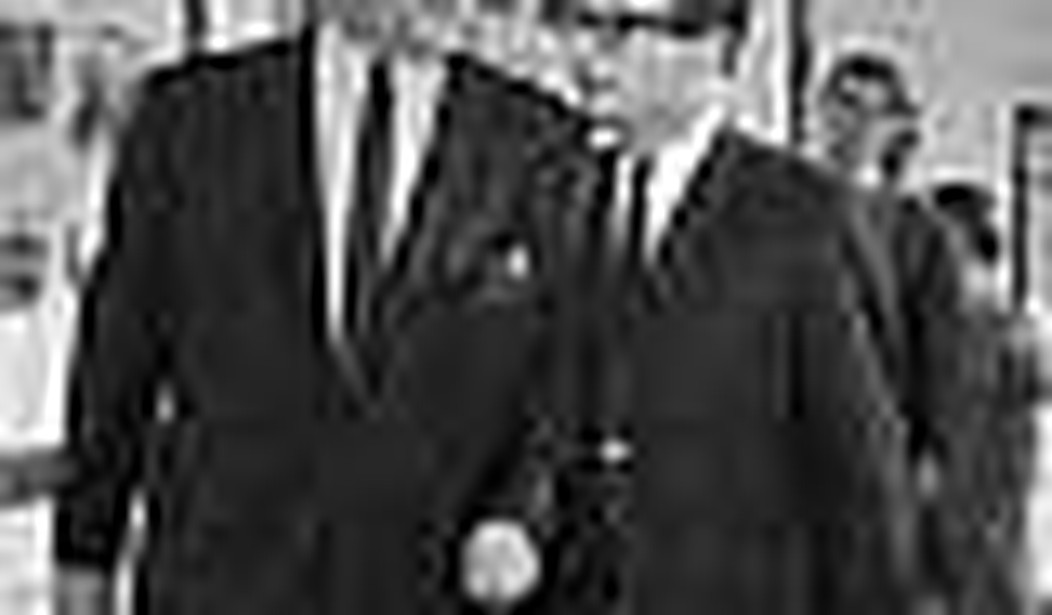On August 17, 2007, Bill Moyers closed Bill Moyer’s Journal, his weekly show on the taxpayer-subsidized Public Broadcasting Service (PBS), by bidding farewell to Karl Rove, a top aide to President Bush who was leaving his job as deputy chief of staff at the end of the month:
Using church pews as precincts Rove turned religion into a weapon of political combat — a battering ram, aimed at the devil’s minions, especially at gay people.
Interesting how Moyers, a former Democratic White House press secretary under Lyndon Johnson, singles out an aide to a Republican president for using gay people as political fodder. When he occupied a similar position in the White House of LBJ — a president far more eager than Rove’s employer to destroy his political opponents — Moyers did not hesitate to use sexuality as what he might call a “weapon of political combat.”
And not just political combat. Moyers even tried to find out about the sexuality of a number of aides to his Democratic boss.
When investigating the secret files of longtime FBI Director J. Edgar Hoover in 1975, then-acting Attorney General Laurence Silberman learned how Hoover “had allowed — even offered — the bureau to be used by presidents for nakedly political purposes.” Bill Moyers took advantage of that invitation to help his boss deal with a crisis which the Democrat feared could jeopardize his reelection in 1964.
In October, just a few weeks before the election, Washington, D.C. police arrested one of the president’s top aides, Walter Jenkins, catching him having sex with another man in a YMCA bathroom. “Moyers … was tasked to direct Hoover to do an investigation of Goldwater’s staff to find similar evidence of homosexual activity. Mr. Moyers’ memo to the FBI was in one of the files.”
Moyers confirmed the authenticity of the memo to Silberman, concerned how he would “explain this to his children.”
Moyers didn’t just seek to use sexuality as a weapon of political combat. He even helped Johnson investigate the sexuality of another top aide to Johnson, Jack Valenti, and others in the administration. Reviewing “[p]reviously confidential FBI files,” Washington Post reporter Joe Stephens discovered that Moyers was “seeking information on the sexual preferences of White House staff members.”
Stephens unearthed memos where Moyers requested the FBI investigate administration officials “suspected as having homosexual tendencies.” That is, he asked a government agency to look into the private lives of his own colleagues — not those accused of seeking to undermine the administration’s policies or to compromise national security, but those suspected of harboring tender feelings for the same sex.
This very Bill Moyers who, as an aide to a Democratic president wanted the FBI to root around in the private lives of his fellow White House aides as well as those of his boss’s Republican rival for the White House, has devoted a number of television broadcasts to lamenting how the policies of a Republican president infringed upon the privacy of Americans. As the editors of the Wall Street Journal put it, he routinely sermonizes “about what he claims are abuses of power by his ideological enemies. Since 9/11, he has been particularly intense in criticizing President Bush for his antiterror policies, such as warrantless wiretapping against al Qaeda.”
The operative expression here is “ideological enemies.” It links Moyers’ actions in the 1960s to his laments in the first decade of the 21st century. Back then, he snooped around in men’s private lives for political reasons. Today, he condemns policies which allow federal authorities to investigate suspected terrorists for national security reasons. In the first case, he acted on behalf of a Democratic president. In the second, he criticized the policies of a Republican.
On October 26, 2007, in one of his many programs devoted to criticizing the Republican president’s anti-terror policies, Moyers said:
Critics claim the President has used the war on terror to put himself above the law and that he has created a secret presidency of classified decisions and orders, that approve extraordinary renditions, torture, illegal detentions, and wiretapping without warrants with the collaboration of big telecom companies. This boundless secrecy and surveillance evokes images counter to American values.
By Bill Moyers’ own definition, then, he engaged in policies which ran counter to American values. He had asked the FBI to put men “suspected of having homosexual tendencies” under surveillance.
This wasn’t the first time Moyers faulted the Republican administration’s anti-terror surveillance policies. On September 7, 2007, Anthony D. Romero, executive director of the American Civil Liberties Union, appeared on his show to take issue with legislation passed by a Democratic Congress amending the Foreign Intelligence Surveillance Act (FISA), giving “the government broad new powers to listen in on private communications here at home, including phone calls and e-mails to and from the country, to tap into foreign intelligence. And to do so, without court orders.”
I daresay Moyers didn’t ask J. Edgar Hoover’s FBI to secure a court order before investigating the private lives of his White House colleagues.
Last December, Glenn Greenwald, a longtime critic of the Bush administration’s anti-terror policies, appeared on Bill Moyers Journal to discuss Bush’s legal legacy. Greenwald contended the then-president “ordered illegal surveillance on the American people even after his own Justice Department told him that doing that was illegal and even after they threatened to resign if it didn’t stop. So this is the kind of criminal intent, deliberate law breaking that we punish on a daily basis in this country.”
Commenting this weekend on the latest revelation about his December host’s past actions, Greenwald, who is openly gay, refused to criticize Moyers for requesting such surveillance on people suspected of having the same sexual tendencies as he. Instead, he chose to fault bloggers who have commented on the story:
They’re the same people who embraced and justified full-scale, impenetrable federal government secrecy and comprehensive domestic spying databases conducted in the dark and against the law when perpetrated by a Republican President — but have spent the last week flamboyantly pretending to be scandalized and outraged by the snooping which Bill Moyers did 45 years ago (literally) as part of a Democratic administration.
Just like Moyers, Greenwald would rather attack his ideological enemies — even as he ignores the fact that Glenn Reynolds (the one blogger he links) often criticized the Bush administration’s anti-terror policies and never embraced nor justified “full-scale, impenetrable federal government secrecy and comprehensive domestic spying databases.” Yes, Greenwald’s got a point that this happened 45 years ago. But doesn’t it bother Greenwald that Moyers never publicly acknowledged what he did, much less apologized for it?
I wouldn’t expect an apology from Moyers. My Google searches yielded no evidence of a public acknowledgment by him of error in this matter. Moyers does not readily admit his mistakes. When former Interior Secretary James Watt informed the one-time Johnson administration official that he had misquoted him, Moyers expressed “regret” for using a quote he had not confirmed. But at the same time he lambasted the man he had wronged, telling Watt that he found “his policies as secretary of the interior abysmally at odds with what I, as well as other Christians, understand to be our obligation to be stewards of the earth.”
Similarly, should he publicly address his surveillance of men suspected of having homosexual tendencies, will Moyers — as Greenwald did — use it as an occasion to bash his ideological enemies?
It seems that the driving force of Moyers’ “journalism” remains the same as that of his role as a operative for a ruthless Democratic president: undermining his political foes. Commenting on one of those foes, the Bush administration, which he frequently called a “regime,” Moyers contended its “unlimited view of authority may well be the centerpiece of his legacy.”
Moyers too seems to have an unlimited view of authority, provided of course it’s used to undermine his ideological adversaries. And sometimes even his own colleagues, if he fears their private lives could damage the politicians he favors.









Join the conversation as a VIP Member